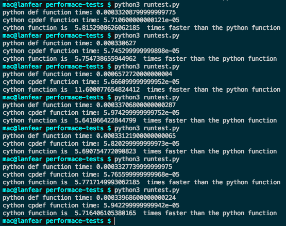cython notes 0
last updated: 02 Jun 2019
repository of my complied code to go with notes:
cython
cython is python with statically typed python/C data types, so essentially a mash-up of performance benefits of C and high-level ease-of-programming of python
-
cythonispython– almost any piece ofpythoncode is also validcythoncode cythonis not apythontoCtranslator, it is an alternative complier forpython- more specifically, an optimizing static compiler
- the code runs within the
pythonruntime environment; but rather than compiling to interpretedpythoncode, it compiles to native machine code
cython benefits
- because parameters and variables can be declared to have
Cdata types and explicitly declaredpythonvariable types (statically typed), code which manipulatespythonvariable types andCvariable types can be freely intermixed, with conversions occurring automatically wherever possible - reference count maintenance and error checking of
pythonoperations is automatic python’s exception handling facilities, including thetry-exceptandtry-finallystatements, is available to in the midst of manipulatingCdata
compiling code with cython
- one of the hardest part of getting started with
cython: figuring out how to compile the code filecythonuses ‘.pyx’ file extension instead of the typicalpython’s ‘.py’ extension
-
to compile with
cythonto ‘.cfiles, savepythoncode to a '.pyx' extensioned file (fileToComplie.pyx` for example) -
then, create a
setup.pyin the same directory with following code:from distutils.core import setup from Cython.Build import cythonize setup( ext_modules = cythonize("fileToComplie.pyx") ) -
then, run this
setup.pyfile to build the ‘.pyx'file toC:$ python setup.py build_ext --inplacethis will create a ‘
.c’ and a ‘.so’ (shared object) in the working directory along with abuilddirectory -
then, in the
pythonCLI, do:import fileToCompilethis will import the complied ‘
.so’ intopythonas a package, and immediately run the script (displaying anyprintstatement outputs) - the functions defined within this
importcan be used like using functions from any other importedpythonpackage
cython data types
cythondata types have to be defined explicitly in the ‘.pyx’ file code to utilize the statically typed performance benefits- using
cdeforcpdefalong with explicitly setting variable type enables compilation to machine level code -
statically typed
python-stylecythonvariables:cdef int x,y,z cdef char *s cdef float x = 5.2 (single precision) cdef double x = 40.5 (double precision) cdef list languages cdef dict abc_dict cdef object thing
- using
- function definition prefixes
def: regularpythonfunction interpretation, returnspythonobjectcdef:cythononly functions, can’t access these frompython-only code (.pyfiles), must access withincython, since there will be noCtranslation topythonfor thesecpdef: forcythonandpythoncompilation , will create acythonfunction and a wrapper forpython- in some cases when there is a
Conly pointer like aCarray, thencpdefwill throw errors
- in some cases when there is a
-
Carrays (in lieu ofnumpyarray) can be used throughcythonby usingfrom cython.view cimport array as cvarray
python 3 compiler directive
- add
# cython: language_level=3as the first line of the.pyxfile to ensure complier knowspython3code is being complied
learnings
-
cythonis a compiler which compilespython-like code files toCcode -
cythonis not apythontoCtranslator, the code runs within thepythonruntime environment; but rather than compiling to interpretedpythoncode, it compiles to native machine code -
cythondata types have to be defined explicitly in the ‘.pyx’ file code to utilize the statically typed performance benefits -
having compared a mean-squared-error function performance in
cythonandpython, thecythonfunction is 5 times faster on an average

fig: performance boost measurement with timeit
- run
runtest.pyinperformance-testsfolder in the work-bench repository to see performance results on your machine